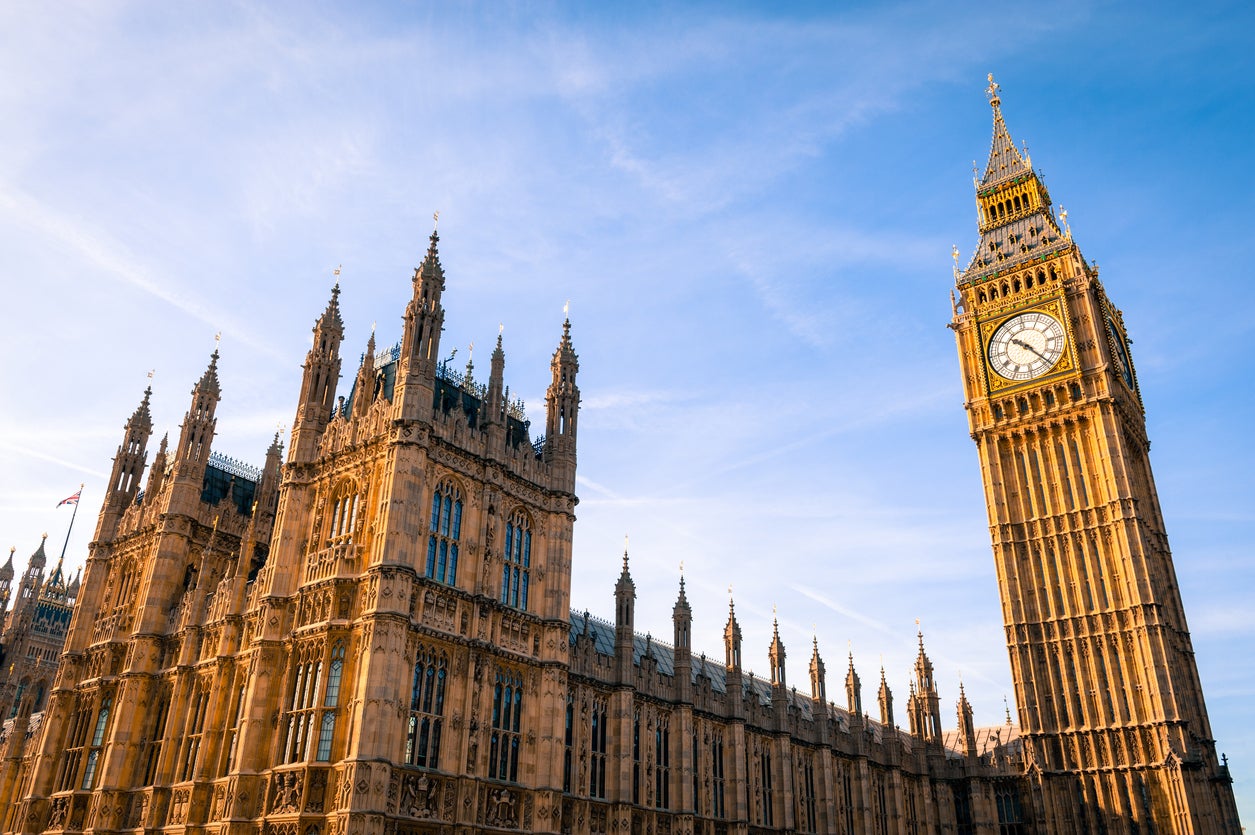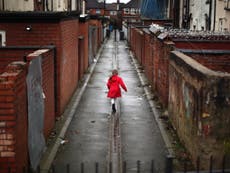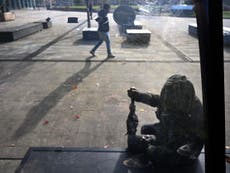The child poverty crisis unfolding across the river from Parliament
Children in crisis: While MPs vote against free school meals during holidays, just yards away on the banks of the Thames parents are struggling to feed their children. May Bulman talks to those living in poverty within sight of Westminster


Your support helps us to tell the story
From reproductive rights to climate change to Big Tech, The Independent is on the ground when the story is developing. Whether it's investigating the financials of Elon Musk's pro-Trump PAC or producing our latest documentary, 'The A Word', which shines a light on the American women fighting for reproductive rights, we know how important it is to parse out the facts from the messaging.
At such a critical moment in US history, we need reporters on the ground. Your donation allows us to keep sending journalists to speak to both sides of the story.
The Independent is trusted by Americans across the entire political spectrum. And unlike many other quality news outlets, we choose not to lock Americans out of our reporting and analysis with paywalls. We believe quality journalism should be available to everyone, paid for by those who can afford it.
Your support makes all the difference.As Conservative MPs voted against providing school meals to children over half-term from the leather seats in the House of Commons last month, youngsters in cramped homes just across the river were sitting in candle-lit homes going hungry. The decision to reject Marcus Rashford’s plea to feed youngsters over the holidays will have meant little to many of those who frequent the corridors of power, but for families living yards away from Parliament, it removed a lifeline.
Surrounding the Palace of Westminster is a hub for tourism and wealth. Yet nearly half of all children living in Lambeth, which encompasses the Waterloo area just across the bridge, live in poverty. Across the four main food banks in the borough, 19,900 people were given emergency food parcels between April and September 2020 alone – of whom four in 10 were children. The coronavirus pandemic has exacerbated hardship on Parliament’s doorstep, with demand having more than doubled compared to the same period last year.
And yet tourists who visit London and photograph Big Ben as it sits proudly beside the River Thames will know nothing about the child poverty crisis playing out on the other side of Westminster Bridge. The hardship that so many are living in is hidden; their rundown estates are obscured in the shadows of the shiny hotels that sit garishly on every other street, as children fall deeper into destitution.
A world apart
“I’ve been lighting candles to save on the electric,” says mother-of-four Helen, 42, who lives yards from the London Eye in Lambeth. Her electricity bills have been higher than usual since March, as have other household expenses. She is one of the thousands who have had to use the local food bank since Covid-19 hit. “It was embarrassing going to the food bank, but I had to because I had to pay the bills. Everything was rolling in too quick for me. I didn’t have a choice.”
The single mother, who has lived in the area for 23 years, says she is sometimes unable to give her 12-year-old daughter more than a piece of dry toast before she goes to school, because she cannot afford a tub of butter. “I go completely without food some days,” she says. “I’m exhausted. I’ll fall asleep on the sofa for an hour because I have no energy.”
Rebekah Gibson, manages the local foodbank for charity Oasis Hub Waterloo, a branch of national charity Oasis – which runs two academy schools in the area. It is closer than any other to the Houses of Parliament. She explains that before the pandemic hit, it was a “common theme" for parents to come in and say they had not eaten in order to feed their children – but that those situations had now become “more frequent and more acute”.
The main factor had been living expenses rising quicker than incomes – a problem for poorer families across the country, but affecting those in inner-cities more. Wages and working age benefits – frozen for seven years until this April – no longer meet the cost of housing or local supermarket prices, which in Waterloo tend to be the smaller “express” versions of the larger shops, meaning they charge considerably more for basic groceries.
“Sometimes people end up being forced to move to other parts of the country to be able to access affordable housing, even when their whole community and support networks are here,” says Rebekah.
Helen, who is unemployed, lived in a two-bedroom flat with four children for 12 years, until she was offered a larger council house, down the road from the previous one, last year. “We didn’t used to have a living room. My youngest daughter had never sat on a sofa before,” Helen says. “We have more space now, but the rent and the council tax are much higher. Sometimes I wish we’d stayed where we were before. It felt more like home.”
The single mother feels increasingly as though her family does not belong on the area. “I walk around with my 12 year old. We go to South Bank. She went on the London Eye with primary school, but I wouldn’t have been able to afford for her to do that. We’re so close to it, but we can’t use any of it because we can’t afford it.
“People say you’re lucky to live in this area. But you can’t live in this area. No one sees behind closed doors. People say you’re say lucky you can see the Big Wheel – yeah it’s a great view, but you can’t even get a job.”
Felicity Maries, community development manager at Oasis Community Hub, has supported 140 local families with practical support ranging from school uniform to beds, digital devices and gas and electricity top-ups since April 2020. She explains that for some of the families, the tourist spots on their doorstep are too daunting to venture out to.
“They don’t even go to the South Bank. We have kids who live in the shadow and they’ve never been to the South Bank. They live within hundreds of metres from it, but it feels like another world to them.”
Half-term hunger
As the London Eye, the UK’s most popular paid tourist attraction, elevates tourists 160 metres into the air to take in expensive views of the capital, children whose parents couldn’t afford to feed them a proper breakfast sit in classrooms beneath it with rumbling stomachs.
Four in 10 of pupils who attend Oasis Johanna primary school, which sits yards from Waterloo station, are eligible for free school meals. Head teacher Di Morgan, who has been at the school for 16 years, says there are also many children whose parents can’t afford school lunches, but who don’t fall beneath the £16,190 annual household income threshold to be eligible. “We feed everyone, no matter if we get the money back or not,” she says. “Kids are finding things even more difficult now, the least we can do is feed them.”
While the school tries to provide what they don’t get at home during term time, things become more challenging for low income families during the holidays. After the government rejected Rashford’s call for free school meals over the October half-term, Lambeth council stepped in, announcing that all low income pupils in the area would receive £15 for the week, at a cost of £165,500 to the local authority.
But because it was a last-minute intervention, the distribution of vouchers took several days, with some families not receiving them until the middle of the week. The community hub had more than a dozen emails in the first weekend of half-term from worried parents who had never asked for help before but now needed support to feed their children.
No pathway to work
An inner-city location filled with plush hotels and coffee shops might usually be associated with endless job opportunities in catering and hospitality. With businesspeople coming through Waterloo on a regular basis and tourists frequenting the many hotels, it’s easy to think anyone living in the area would have no shortage of employment options.
But the reality is quite different. Maries points out the fact that there’s a multitude of hotels in the area, yet of the many families she has worked with and supports locally, she doesn’t know anyone who has worked in one of them – other than a couple of cleaning jobs. “Why haven’t we got people who are more than capable working in reception and being trained up?” she asks. “There’s just no pathway, there’s no access point.”
Helen has experienced this first-hand. She has applied for jobs in a number of coffee shops and department stores in the area. “I went for an interview at Marks and Spencer’s two years ago and how they looked at me because of how I was dressed,” she remembers. “From the moment I spoke they knew that I wasn’t educated, so I didn’t get the job. That’s knocked my confidence.”
The London resident, who says she left school at 12 because she had to help with caring responsibilities for family members, spends many hours a week visiting elderly people in her neighbourhood. She would like to take up a job as a carer, but due to her lack of qualifications, she doesn’t believe it is within reaching distance for her. “I’d like to care for the elderly, but it’s so difficult to get a job,” she says. “I would have to sit in college for two or three years. I don’t think I can sit in class again for 18 hours a week.”
And even when people do work, many of them remain in poverty. Nathan Jones, who has worked for Oasis supporting low income families in Waterloo for over a decade, says that while the food bank used to run in the week only, the charity made the decision in 2016 to open it on Saturday mornings, after discovering that many people who were struggling to afford food were in fact working full-time jobs.
“We were seeing more and more people struggling to get to us during the week,” says Jones. “I had a conversation with a woman who was getting two buses every morning and evening, travelling for about two hours, to get to a job that was paying her minimum wage. She came to our food bank on a Friday morning because she was off sick that day. She seemed really ill but she’d dragged herself out of bed because she knew it was the only way she’d be able to get to the food bank.”
Gibson is keen to stress that many of those who are unemployed and using the food bank simply cannot work. “Disproportionately the people who come to the food bank are in single parent families or have health issues or disabilities," she says. "There’s this myth that there are loads of people who are living a life nice on benefits and don’t want to work, but that’s absolutely not what we see. The vast majority of people who are able to work are working.”
Blocked from benefits
Since being elected as MP for Bermondsey and Old Southwark in 2015, Labour’s Neil Coyle began to notice a pressing and increasing need. More and more people in his constituency – which sits next to the Waterloo area – were appealing to him for help because they couldn’t afford food. In 2017, he took the radical measure of setting up an informal food bank in his constituency office.
“People would come in on a Friday, and we wouldn’t be able to get them to a food bank until Monday. They would be in deep,” says the MP, who is also chair of the All Party Parliamentary Group for food banks. “There was one woman who was coming in every week for support with an immigration issue. One time she came in she walked into the table. You could tell she was physically weak.
“I got her son in the other room with some chocolates and asked her when she’d last eaten. She said it was three days. Everything that was coming in she was giving to her son. I couldn’t let someone leave in those circumstances.”
Coyle says that while the families he provides food to are struggling with a range of issues, a large number of them are immigrants who live and work in Britain legally but have no recourse to public funds (NRPF) – a condition attached to one’s status that prevents them from accessing state support. Citizen’s Advice estimates that 1.4 million people are in this position.
“It’s absolutely horrific,” he says. “There are British-born children, born in St Thomas’ hospital down the road, attending the same school as a kid born in the next bed, but because of where their parent was born, they are not entitled to child benefit or other help.”
One person who has been at the hard end of the government’s NRPF conditions is Dorcas, 51, who lived in various places between Lambeth and Southwark areas for 15 years, and recently moved to Croydon. She had been working as a teaching assistant, which brought in an income that was just about sufficient to provide for her and her teenage son, although they were having to share a bedroom. When she fell ill with sickle cell disease in 2016, everything spiralled into crisis.
“I couldn’t work, couldn’t pay the rent," says Dorcas, who moved to the UK from Nigeria 17 years ago. "The day we got evicted, I was on hospital admission, so only my son was at home. They had to evict him. They took him to Southwark Council as a homeless person, but they said they couldn’t help us because we had no recourse.”
The mother and son had no option but to move between the living room floors of relatives and friends for two months. During this time, her son was preparing for his GCSEs, and the lack of stable accommodation was making it difficult for him to study, at which point his school, Oasis Academy South Bank, got involved. They were subsequently placed by the council in a shared flat in Peckham, where they were sharing a bedroom.
Last year, they were finally moved to a two-bedroom flat in Croydon, and Dorcas was granted access to public funds. Her son, now 18, this year started an accounting degree at Nottingham University. She is immensely proud of him, but she will never forget the dark period they went through.
“If we hadn’t got help, I wouldn’t have been able to carry on living. I couldn’t cope anymore. I felt like I didn’t have a reason to live,” remembers Dorcas, adding: “The idea of giving people right to stay but no recourse to public funds when they’ve got children is ridiculous. It doesn’t make sense. The children are the ones who suffer most.”
Perpetual poverty
Oasis is one of the charities across the UK serving as a lifeline to struggling families, particularly through the pandemic – but its devoted staff members are looking to the corridors of power across the river for policies that will create a real escape route to those in financial hardship. “There are small things you can do in that moment of crisis, but it’s limited,” says Maries. “All you want to be able to do is empower that person to be in a better situation, but if everything in their life is unmanageable and all having a knock on effect, it’s very difficult.”
Helen is desperate to escape from the poverty she’s lived in for her whole life, but as hard as she tries, she feels there are too many forces pushing her – and her children – back down to a perpetual state of financial hardship. “I just keep seeing the cycle happening again with my own children. I’m struggling like my mum had to struggle, and it feels like the chain isn’t getting broken,” she says.
Councillor Edward Davie, cabinet member for children and young people at Lambeth Council, says that to break these cycles of poverty, the government must “genuinely level up”, by increasing the minimum wage to “living wage” levels and investing more in new social rent homes. He adds that it is also vital to reinforce the welfare safety net by increasing child benefit and maintaining the £20 increase to universal credit, which was announced in April in response to the pandemic.
A government spokesperson said that in response to the coronavirus pandemic, they had boosted welfare support by £9.3bn and introduced income protection schemes and additional support for renters, as well as a Covid winter support package for those on low incomes and £3.7bn for local authorities to help address pressures on local services.
For Helen, though, she can see no way out. “When you have low income, you don’t get the chances that other people get. If I had a job interview tomorrow, or one of my kids did, we probably don’t even have the right clothes for an interview or the experience of how to talk in an interview. We don’t get a chance to get out of this cycle; we can’t afford to.”






Join our commenting forum
Join thought-provoking conversations, follow other Independent readers and see their replies
Comments